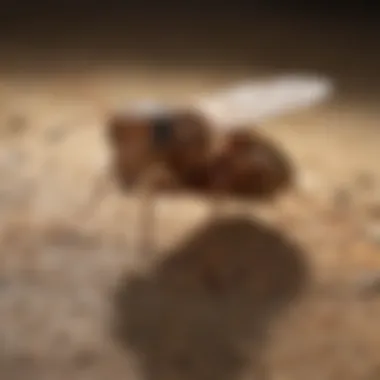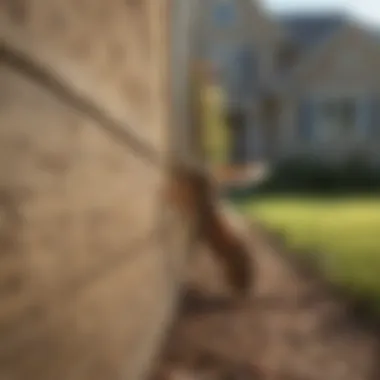Effective Termite Control Strategies in Fayetteville


Intro
Termites can pose significant challenges for homeowners and business owners in Fayetteville, Arkansas. Understanding termite control is crucial because of the economic and structural damage these pests can inflict. In Fayetteville, the warm climate, coupled with moisture-rich environments, creates favorable conditions for termite infestation. This article aims to equip readers with essential knowledge about local termite species, prevention strategies, management practices, and eco-friendly pest control options.
Understanding Pests
Definition of Pests
Pests are organisms that can harm human interests, whether through destruction or disease transmission. They typically reproduce rapidly and can adapt to various environments. Termites, specifically, fall under this category due to their wood-eating habits, which can lead to significant damage in homes and buildings.
Importance of Pest Identification
Identifying the specific type of pest is fundamental in crafting effective control strategies. In Fayetteville, you may encounter several termite species, including the Eastern Subterranean termite and the Formosan termite. Accurate identification informs the choice of treatment and prevention measures. Ensuring that homeowners recognize signs of infestation, such as mud tubes and discarded wings, is vital for prompt action.
Prevention Techniques
Home and Garden Preventative Measures
Prevention is often more effective than treatment. Homeowners can adopt several strategies:
- Reduce Moisture: Repair leaks and improve drainage to minimize water accumulation.
- Wood Treatment: Utilize borate treatments on wooden structures as a protective measure.
- Barrier Installation: Implement physical barriers, such as steel mesh or concrete, to prevent access.
Seasonal Prevention Tips
In Fayetteville, seasonal changes can influence pest behavior. Homeowners should be proactive throughout the year:
- Spring: Inspect for early signs of termite activity as the weather warms.
- Summer: Focus on treating and sealing entry points before the peak breeding season.
- Fall: Prepare for winter by clearing away wood and debris that attract termites.
- Winter: Regularly check basements and crawl spaces for any signs of moisture and pest presence.
Eco-Friendly Pest Control Solutions
Overview of Sustainable Practices
With growing concerns about environmental health, more homeowners are looking for sustainable pest control solutions. Integrated Pest Management (IPM) is a holistic approach that combines various control methods while minimizing environmental impact. This includes physical, biological, and chemical control measures that are more sustainable than traditional methods.
Natural Remedies and Their Effectiveness
Many natural remedies hold potential for termite control, though effectiveness can vary:
- Orange Oil: Contains d-limonene, which can be toxic to termites upon contact.
- Nematodes: These microscopic worms can effectively target termites underground.
- Boric Acid: Used as a stomach poison for termites, providing less environmental harm compared to conventional pesticides.
"In pest control, natural solutions are often more sustainable. Understanding how to use them effectively can help preserve the environment while managing infestations."
By considering both traditional and eco-friendly methods, homeowners in Fayetteville can develop a comprehensive termite management strategy. Protecting your investment and maintaining the integrity of your property requires vigilance and informed action.
Prelims to Termites
Termites represent a significant challenge for homeowners, particularly in regions like Fayetteville, Arkansas. Understanding these pests is crucial not only for effective control but for the preservation of property value. The delicacy of their presence requires an informed approach to both prevention and treatment.
Understanding Termite Biology
To manage termites effectively, one must first grasp their biology. Termites are social insects that thrive in colonies, typically consisting of workers, soldiers, and reproductive individuals. The workers are responsible for foraging, nest building, and caring for the queen and her eggs, while soldiers defend the colony against threats. Most termites rely on microorganisms in their guts to digest cellulose found in wood. This ability to break down tough organic materials makes them ecologically important yet destructive to wooden structures.
Termites prefer humid environments, and their presence often goes unnoticed until substantial damage occurs. Understanding their reproductive cycles and nesting habits can improve detection and intervention strategies for homeowners.
Types of Termites within Fayetteville
Fayetteville is home to various termite species, each with unique characteristics and behaviors. The Subterranean termite is the most common and poses the highest risk due to its affinity for underground habitats, allowing them to travel unnoticed beneath homes. The Drywood termite, though less prevalent, also establishes colonies in dry wood and can cause significant damage without showing visible signs.


Additionally, the Formosan termite has made its presence known in some areas, often known for its aggressive behavior and large colony sizes. Identifying these species requires knowledge of their structural preferences and signs of infestation. This understanding allows homeowners to take proactive measures tailored to the specific threats their property faces.
"Understanding the types of termites and their behaviors is vital for effective control measures."
Addressing the issue of termites early can save homeowners substantial costs related to repairs and pest management. This exploration into termite biology and species types establishes a foundation for discussing the broader impacts of termite infestations and effective management strategies.
The Impact of Termites on Properties
Understanding the impact of termites on properties is essential for homeowners in Fayetteville. This awareness not only safeguards physical structures but also preserves financial stability. Termites can cause a significant amount of damage, which often goes unnoticed until the situation has escalated. Recognizing these potential impacts helps in proactive management and fosters long-term home care strategies.
Structural Damage Overview
Termites, particularly the Eastern subterranean and Formosan termites common in Fayetteville, can inflict substantial harm. They feed primarily on cellulose found in wood, which means any wooden structure is a potential target. This feeding can lead to critical loss of structural integrity. When termites invade a home, they can hollow out wood beams, floors, and even walls.
The signs of termite damage might not be evident immediately. Homeowners often overlook small holes, peeling paint, or soft spots in wood. Over time, minor damage can escalate into severe issues.
Regular inspections are key. According to pest control experts, homeowners should look closely at areas where wood meets the ground, like porches and deck supports.
Financial Implications of Infestations
The financial fallout from a termite infestation can be considerable. Home repairs can quickly become burdensome, often costing thousands of dollars. According to the National Pest Management Association, homeowners in the U.S. spend over $5 billion annually on termite control and repair.
It is essential to consider not only the immediate repair costs but also the potential decrease in property value. A history of termite damage can deter buyers and affect the resale value.
Furthermore, many homeowners’ insurance policies do not cover termite damage. Understanding one's policy is crucial, as this means that homeowners may have to shoulder the entire financial burden themselves.
The best defense against these repercussions is early detection and regular maintenance. Knowing the signs of termite presence can save considerable costs in repairs.
Common Signs of Termite Infestation
Identifying the signs of termite infestation is critical for homeowners in Fayetteville. Early detection helps prevent extensive damage to property. Termites tend to be silent destroyers, working inside walls and under floors, making their presence hard to notice until serious damage has occurred. Understanding common signs allows homeowners to take swift action, saving not only structural integrity but also financial resources.
Visual Indicators
There are several visual clues that can suggest the presence of termites.
- Mud Tubes: These tubes are made of soil and wood particles. They serve as a passageway for termites to travel from their nest to food sources without exposing themselves to the open air. Finding mud tubes on foundations or walls is a strong indicator of termite activity.
- Damaged Wood: If wood sounds hollow when tapped or has soft spots, it may indicate that termites are eating through it. This is especially true for wooden beams, flooring, and furniture.
- Swarmers: The presence of winged termites, often seen in spring, is another clear sign. Swarming occurs when a colony has matured, and it looks for new places to establish a nest. Finding wings discarded near windows or under light fixtures can indicate a developing infestation.
Auditory Clues
Homeowners may also notice sounds as a hint of termite presence.
- Clicking Noises: When termites tunnel through wood, they can create a faint clicking sound. This usually comes from soldier termites who knock their heads against wood to signal danger to the colony.
- Rustling Sounds: In quiet spaces, homeowners might hear soft rustling noises coming from inside walls. This sound typically indicates ongoing activity, especially during the night when termites are more active.
Subtle Symptoms
Not all indicators are overt; some are less obvious yet equally important to recognize.
- Frass: This is basically termite droppings. The pellets are small, resembling wood shavings or sawdust. Finding frass near wooden structures indicates a feeding problem.
- Paint Damage: Bubbling or peeling paint can sometimes be a subtle sign of termite activity. Moisture from tunneling may cause paint to lose adhesion and appear damaged.
- Small Holes in Wood: Tiny holes in exposed wood surfaces can signify that termites have bored into the wood. This damage may not always be visible until you investigate further.
Identifying these signs early on can save considerable time and money in the long run.
Prevention Strategies for Homeowners
Effective termite control begins with prevention. Homeowners need to realize that proactive measures greatly reduce the risk of infestations. Termites can cause significant damage to the structure of a home, impacting both safety and financial investment. Therefore, understanding and implementing prevention strategies is a vital component of pest management.
Soil Treatment Methods
Soil treatment is an essential aspect of termite prevention. This method involves applying chemical barriers in the soil surrounding the foundation of a home. These treatments are designed to deter termites from tunneling into the structure. A common approach is to use termiticides, which can either kill termites on contact or repel them effectively.


It is crucial to engage a professional to apply these treatments since they have access to specialized products and equipment. An experienced pest control specialist can determine the right barriers to use based on the surrounding soil conditions and construction materials. This targeted approach provides homeowners with confidence that they are minimizing the risk of infestation.
Regular Property Inspections
Regular property inspections play a critical role in early detection of potential problems. Homeowners should schedule inspections at least once a year, especially in areas prone to termite activity. During these inspections, professionals look for signs such as mud tubes, discarded wings, or wood damage.
Many homeowners overlook the importance of these inspections. However, timely identification of termite activity allows for prompt intervention, which is often less costly than extensive repairs. This small investment in preventative care can save large sums in the long run. Furthermore, maintaining open communication with pest control providers aids in staying informed about any developing threats.
Home Maintenance Practices
Engaging in consistent and thorough home maintenance is also key to preventing termite infestations. Simple practices can make a significant difference. This includes ensuring proper drainage around the foundation, sealing cracks, and repairing leaks. Keeping wood piles away from the home and removing dead trees or stumps also helps deter termites from invading.
Homeowners should also consider landscaping choices. Avoiding wood mulch near the foundation can reduce attraction points for termites. Instead, gravel or stone may serve as better alternatives. By addressing these maintenance issues, homeowners contribute to a less inviting environment for these pests.
Professional Pest Control Services
Professional pest control services play a crucial role in effectively managing termite infestations in Fayetteville, Arkansas. While homeowners may take initial steps to protect their properties, the complexity of termite behavior and the potential for significant damage necessitate specialized knowledge and equipment. Utilizing a professional can ensure a more thorough and effective approach to pest management, allowing for peace of mind and better protection of one’s investment.
One key benefit of hiring professionals is their access to advanced techniques and solutions. They are trained to identify not just the visible signs of termites but also the underlying issues that contribute to infestations. Professionals can pinpoint the source of the problem, which is essential for lasting treatment. Additionally, their familiarity with local species and regulations enhances their ability to implement effective solutions.
Moreover, employing expert services can be a time-saver for homeowners. Termite treatments often involve multiple visits, ranging from inspection to full remediation. Professionals can efficiently manage the process, minimizing disruption to daily life. Homeowners receive detailed plans tailored to their unique situations, which can significantly mitigate the environmental and structural risks that termites present.
Choosing the Right Exterminator
Selecting the right exterminator is vital for achieving the desired results in termite control. Homeowners should consider several factors when making their choice, such as experience, reputation, and methodology. It is beneficial to look for companies that specialize in termite control rather than general pest management. This focus ensures that the service provider is well-versed in specific techniques and solutions pertinent to local termite species.
Additionally, homeowners should seek out reviews and testimonials from previous clients. This feedback can provide insight into the company's reliability and effectiveness. Word of mouth can also serve as a valuable tool; asking neighbors or friends about their experiences may reveal reputable local options.
Other important considerations include asking for certifications and ensuring that the exterminator uses environmentally friendly methods, if that aligns with a homeowner’s values. Engaging in thorough discussions before service is rendered allows homeowners to gauge the professionalism and expertise of the exterminator.
Methods Employed by Professionals
The methods used by professional pest control services vary significantly, depending on the extent of the infestation and specific conditions of the property. Generally, these methods can be categorized into chemical and non-chemical treatments.
Chemical treatments often include liquid insecticides and baiting systems designed to eliminate termites effectively. Liquid treatments create a barrier that prevents termites from entering the structure. Baiting systems usually contain a slower-acting toxic material, allowing termites to carry it back to their colony, thereby affecting more of the population.
On the other hand, non-chemical methods are gaining prominence due to their eco-friendly nature. These include heat treatment, which involves raising the temperature of an infested area to a lethal level for termites, and biological control, where natural predators are introduced to limit termite populations.
Whichever method is employed, professional services ensure that the process is safe and compliant with health standards. Pest control experts come equipped with the know-how to implement these strategies effectively, transforming a potentially overwhelming issue into a manageable solution.
"The right exterminator can protect your home from termite damage effectively, preserving not only your property but also your peace of mind."
Eco-Friendly Pest Management Solutions
Eco-friendly pest management solutions are central to modern termite control strategies. In Fayetteville, Arkansas, where sustainability is increasingly valued, these methods help in managing termites without harming the environment. Eco-friendly approaches not only focus on defending properties but also promote a healthier ecosystem. This is significant for homeowners and housewives who seek effective yet responsible solutions for pest management.
Natural Repellents
Natural repellents serve as an important tool in eco-friendly pest control. These are substances derived from natural sources that deter termites without the harsh chemicals commonly found in traditional pest control methods. For example, essential oils from plants like clove or orange have proven termite-repellent properties. They work by masking the pheromones termites use to navigate their environment, effectively disrupting their communication.
Benefits of using natural repellents include:
- Safety for Children and Pets: Natural ingredients are typically less harmful than synthetic substances.
- Less Environmental Impact: Most natural repellents degrade more quickly and do not persist in the environment.
- Affordable Options: Many natural repellents can be made at home, which can reduce overall costs.
However, it's essential to understand that while natural repellents can be effective, they often require more frequent application than chemical treatments. Homeowners should be prepared for regular reapplication, particularly in high-risk areas.
Biological Control Methods


Biological control methods utilize natural predators or pathogens to manage termite populations. This technique is gaining traction as a sustainable alternative to chemical pesticides. For example, nematodes are microscopic worms that can be introduced into the soil where they seek out termites. Once in contact, these nematodes infect and kill their host.
Key advantages of biological control methods include:
- Long-term Effectiveness: They can help maintain a balanced ecosystem, potentially offering ongoing control against infestations.
- Minimal Toxicity: This approach generally poses less risk to non-target species, making it a safer choice for families and the environment.
- Compatibility with Other Methods: Biological control can be incorporated into a broader integrated pest management strategy, enhancing overall effectiveness.
Still, homeowners should assess the viability of such methods in their specific circumstances. Factors like local soil conditions, climate, and the presence of other wildlife may influence the success of biological control efforts.
Utilizing eco-friendly pest management solutions reflects a commitment to both property protection and environmental stewardship, crucial for ensuring sustainability in Fayetteville.
Community Resources and Initiatives
Community resources play an essential role in termite control in Fayetteville, Arkansas. They provide homeowners with access to information, assistance, and services that mitigate the risk of termite infestations. Involving local initiatives not only enhances awareness but also fosters proactive measures within the community. Residents who are educated about termite behavior and control strategies contribute to a more informed neighborhood, potentially decreasing the frequency of infestations.
Local Pest Control Programs
Fayetteville offers several pest control programs aiming to address termite issues effectively. These programs are often coordinated by local government agencies or non-profit organizations. They generally focus on providing affordable treatment options and preventive measures for residents.
- Resources Available: Many programs offer discounted rates for inspections and treatments. This financial support is crucial for homeowners who may otherwise find pest control services too costly.
- Collaboration with Experts: Local pest control programs often partner with professionals who can provide guidance based on the specific conditions of Fayetteville’s environment. This expertise is invaluable in customizing control strategies that are effective against local termite species.
Community members are encouraged to engage with these programs not just for personal benefit but to strengthen communal resilience against pests.
Educational Workshops and Seminars
Educational initiatives in Fayetteville frequently include workshops and seminars aimed at informing the public about termite management strategies. These sessions can significantly impact how residents view pest control.
- What They Offer: Workshops typically cover various topics, including:
- Benefits of Participation: Attending these events allows homeowners to:
- Identification of local termite species
- Signs of infestations and preventive measures
- Updates on eco-friendly pest management approaches
- Gain firsthand knowledge from actual pest control experts.
- Network with other community members who have similar concerns.
- Learn about practical solutions that can be implemented in their homes.
Legal Aspects of Pest Control in Fayetteville
Understanding the legal framework surrounding pest control is crucial for homeowners and property managers in Fayetteville, Arkansas. It influences how pest management services operate and what rights homeowners have when dealing with pest issues, especially termites. Legal requirements can affect treatment methods, safety standards, and liability in case of damages. Not adhering to these regulations can lead to severe consequences including penalties and the potential for increased infestations. Therefore, knowledge of these regulations is essential for informed decision-making and effective management.
Regulations Governing Pest Management
In Fayetteville, pest control is regulated by both state and local laws designed to protect public health and the environment. These regulations encompass various aspects of pest management, such as licensing requirements for pest control operators, standards for pesticide use, and safety measures for both technicians and residents.
- Licensing Requirements: Pest control operators must obtain licenses to legally offer their services. This ensures that technicians are trained and qualified to handle the chemicals and methods safely.
- Pesticide Usage Regulations: The use of pesticides is strictly monitored. This includes guidelines for application methods and restricted use of certain hazardous materials to protect residents and non-target species.
- Notification Requirements: Homeowners may need to be notified before pest control treatments, especially if chemicals are involved, ensuring transparency and safety.
Understanding these regulations can help homeowners choose a compliant pest control service that adheres to safety and efficacy standards.
Homeowner Rights and Responsibilities
Homeowners in Fayetteville have specific rights and responsibilities concerning pest control. These legal parameters not only protect the homeowner but also ensure responsible management of pest issues.
- Right to Information: Homeowners are entitled to receive detailed information about the pest control methods being used on their property. This includes what chemicals are being applied, potential side effects, and any safety precautions required.
- Right to Choose Providers: Homeowners have the right to choose licensed pest control services. This empowers them to make informed decisions based on the reputation and effectiveness of the service provider.
- Responsibility to Maintain Property: Homeowners are responsible for maintaining their property to prevent infestations. This includes regular inspections and necessary repairs that can deter termites and other pests.
- Obligation to Report Issues: It is also the homeowner's responsibility to report any signs of infestation promptly. Early detection is crucial in minimizing damage and control costs.
"Knowledge of legal rights not only empowers homeowners but also fosters a responsible approach to pest management."
By being aware of these legal aspects, Fayetteville homeowners can protect themselves and make the most effective choices for managing pest problems.
Ending
Summary of Key Points
- Understanding Termite Biology: A firm grasp of how termites operate helps in identifying potential threats.
- Signs of Infestation: Knowing what to look for can lead to early detection, saving considerable resources in repairs and treatments.
- Prevention Strategies: Implementing effective soil treatments and regular inspections is essential for safeguarding properties.
- Professional Services: The need for expert intervention cannot be overstated. Professionals are equipped with specialized knowledge and tools that may be beyond the capacity of an average homeowner.
- Eco-Friendly Solutions: Sustainable practices resonate with personal values and ecological balance today.
- Legal Aspects: Familiarity with local regulations informs homeowners of their rights and responsibilities in pest management.
Looking Ahead: Future of Termite Control
As we look to the future, termite control in Fayetteville is set to evolve with technological advancements and better ecological understanding. The future will likely include:
- Innovative Treatments: With ongoing research, expect to see more highly targeted and environmentally safe treatment options coming to the market.
- Smart Monitoring: The integration of smart technology could lead to real-time pest alerts. Systems might emerge that can notify homeowners of an infestation before visible signs occur.
- Community Awareness Programs: There may be increased emphasis on education about prevention and environmentally friendly practices. As communities band together to share knowledge, the mutual benefits will be far-reaching.



